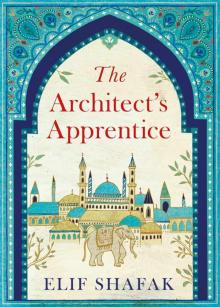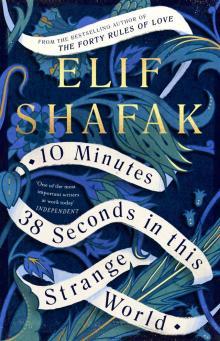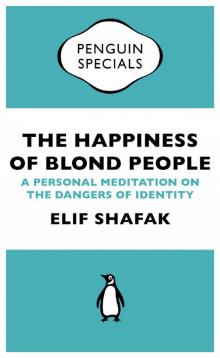- Home
- Elif Shafak
The Gaze Page 2
The Gaze Read online
Page 2
‘Don’t worry about the money, brother, no one is going anywhere! After all, we all live in the same neighbourhood,’ said the taxi driver.
Colours are fa-ding, movements are slow-ing. The man is chewing something. The words tumble out of his mouth: ‘You’re always in this neighbourhood, but, after this humiliation are we going to be able to continue living here?’
He takes a cigarette pack from his pyjama pocket. He suddenly feels guilty. He wants to tell the taxi driver why it is that he brought cigarettes but not his wallet. He can’t speak, his throat is completely dry. He can’t find the lighter in his pocket. He must have dropped it in the taxi. Or else…he hadn’t had it with him from the start. He simply can’t remember how he lit his last cigarette. Or is this his first cigarette? This distresses him even more. While he’s waiting for the car’s cigarette lighter to pop out, he glances towards the back seat. His sister-in-law isn’t shouting any more; she’s just breathing heavily. Also, from time to time she moans as if she’s in pain. Without taking his eyes from the rear-view mirror, the taxi driver lights a cigarette from his own pack. He considers turning on the radio. He changes his mind, it would be inappropriate. The women are embracing their sister and crying silently. Little by little the night is becoming dark-er; step by step the road is getting steep-er. His chest has congested. He opens the window all the way. It’s cold enough out for snow. The cigarette smoke that has built up in the taxi pours out of the window like an ash-coloured kite swinging its tail back and forth.
Sounds are fading, the wind is dying down.
Sounds faded, the wind died down. As they were being closed, the curtains were blown here and there with a terrifying effect peculiar to the curtains in haunted houses in films, ‘They’re going to have to move at first light tomorrow. They’re not going to be able to bear it here,’ said B-C. He added with a twisted smile:
‘When your privacy is gone, you should leave at once!’
The Gaze
‘I was dreaming about a flying balloon. It was in the charcoal-grey sky, among the snow-white clouds, in the shade of the bright-yellow sun. I’d climbed up onto the roof. I’d been watching the flying balloon from below, when a violent wind suddenly blew up. All at once, we were shaken by the violence of this sudden wind. Pitch-black dust swirled up from the ground. The flying balloon was being swept away. I was running as fast as I could over the rooftops to keep it in sight. As I ran, roof-tiles were rolling down. I leaned over to look at where the tiles had fallen. Below, the avenues of the city were sparkling and crowded. Cars had crashed because of the tiles rolling along the road. A bright red, squeaky-clean car was swerving angrily down the middle of the road. The tiles had cracked its windshield. A huge spider had woven a web over the crack. The thin, transparent threads stuck to the glass were waving about here and there. The driver was looking for me, without knowing it was me he was looking for. He could see me, but he didn’t suspect me.
White snow was falling on the pitch-black dust. I started walking along the pavement. I walked very slowly in order to avoid stepping on the little threads. Suddenly, my eyes fixed on my feet. I was wearing woollen baby shoes with a bird design on them. I must have forgotten to put on my shoes when I left the house. I was embarrassed. I had to find shoes somewhere before anyone saw me. The window displays in the shops were lively. There were ballet slippers, shoes lined with fur, sandals, laced boots, high-heeled women’s shoes, round-heeled men’s shoes, gaudy children’s shoes. The labels described what they were. All of the shoes were made of ice-cream. I went into one of the bigger shops and bought mixed fruit flavoured shoes. When I came out, the driver of the car with the cracked windshield had narrowed his eyes, and was watching me carefully. I tiptoed in front of him. He didn’t follow me. As I returned to the pavement, I saw the flying balloon in the shade of the bright-yellow sun. It moved along half-heartedly. The bright-yellow sun came out. I looked at my new shoes with alarm. Drop drop, drop drop…’
‘Come on mother, say something to her!’
I jumped because of the pain in my knee. Again I’d fallen asleep, in a place where I shouldn’t have. I was sweating. As I tried to pull myself together, the smell of my sweat reached my nose. I looked around to see if anyone else could smell it. I was in the minibus. When I got on there was no one else but me. At this hour of the afternoon, it was rare for anyone to be going in that direction, and I knew it wouldn’t fill up easily, and that it wouldn’t leave until it was full. That’s why I was comfortable enough to fall asleep. It wasn’t enough that I’d overdone it at lunch, I’d had two portions of pudding on top of everything else, and I didn’t have enough strength left to walk. I must have slept for quite a while. When I woke, the minibus was completely full. There was only room for one more passenger. When that person came, we’d get under way.
The woman next to me was watching me out of the corner of her eye. She probably noticed the smell of sweat. The girl on her knee kept kicking my knee with the brass buckle of her strawberry coloured shoes. I have no doubt that the child is doing this on purpose. She’s doing it just to wake me up and get me to slide over a bit. And she is the one who keeps whining, ‘Come on mother, say something to her.’ And I had sprawled out in my sleep too. I had to pull myself together right away. I close my legs and slide over toward the window. I take my backpack from the seat and put it on my lap. When I lift the backpack I see a paper bag full of spiced, yellow roasted chickpeas. I’d bought them to nibble on while waiting for the minibus to fill up, and had forgotten them. When I pick up the paper bag, there’s quite a bit of room for the others. But they’re still not happy. Especially the woman, who makes exaggerated movements to show that she’s not going to be able to get comfortable; she keeps crossing and re-crossing her legs; makes rustling noises as she rearranges her packages, first on her lap then under the seat. She squeezes the child on her lap to her breast, saying, ‘Come, darling,’ as if there was anywhere the child could go. She keeps turning and eyeing the last narrow empty seat with worry, and as she does all this she keeps huffing and puffing in complaint. I know this type well. I know why they behave the way they do. I’m used to it. These kinds of things happen to me all the time.
Of course the best thing for me is to take a taxi, or to catch an empty bus. But going everywhere by taxi reduces my budget, and, as you know, it’s not really possible to find an empty bus. Usually I take a taxi to the first stop for the bus I’m taking. But this isn’t convenient for all routes. If the bus is crowded, I rarely get on. And whenever I climb up those stairs and push and shove my way down the corridor to find a place for myself, I regret it a thousand times. A voice within me tells me to get off the bus immediately and go home. As if that were possible. The force of the crowds moving back at the driver’s ill-tempered commands pushes me further from the exit. I see that there’s no escape, and try at least not to make eye-contact with any of the eyes that examine me with curiosity, and point me out to one another. To tell the truth, a lot of people offer me their places. But this doesn’t make things easier for me. Every time, my face gets flushed with heat. I sweat as I struggle into the empty seat. Naturally I always sweat at times like this. Whether it’s summer or winter, the moment I even get a little distressed, ice-cold sweat begins to pour off my back. As soon as I’ve sat down, I sit as straight as a ramrod, so as not to touch the person next to me if I’m in a double seat, or the people standing nearby if I’m in a single seat. At the same time, I try to ascertain whether or not the people around me can smell my sweat. Though there’s nothing I can do about it either way. Anyway, I always sweat more when I try not to sweat. I like sitting next to the window. Next to the window, I’m less aware of the other passengers, and can spend the trip watching people outside.
Sometimes no one offers me their seat. Sometimes it’s impossible to get near the windows either. Then, in order to escape the stares of the people surrounding me, in order not to guess what is on the minds of the people who are looking at me, I look for
a spot that I can stare at vacantly until I reach my stop. As much as I can see through the window between their heads, the passengers’ shoes, shopping bags squeezed between legs, the covers of the books in someone’s hand, the bus’s warning signs, the buttons on the automatic doors, the levers to be pulled in case of emergency, folded newspapers, rings on hands grasping the straps…these are my choices. I’ll pick one of these, and won’t take my eyes off it until I reach my stop. Whether I sit or stand, it’s very difficult for me to take a bus from one place to another. But if you’re as fat as I am, minibuses are even worse than buses.
The child next to me is squeezing the money she wants to pass forward tightly in her palm; despite her mother’s insistence she’s determined to give it to the driver. This child, one of those children whose bedroom was flawlessly prepared when her birth was still just a distant possibility, who was born late and with difficulty, who was prayed for, who wore out the doors of fashionable clinics, the instructions of famous doctors being carried out to the letter, the subject of many tests, expensive treatments, boring arguments, on the threshold of divorce, ‘otherwise we’ll produce a child’, after their consolation, they succeeded only a moment before they lost hope, even a blood clot was considered cause for celebration, her mother didn’t take her eyes off her for a moment, more toys than she could have imagined, tens of photographs taken of her every moment, her every smile inspiring epic poems, her every remark recorded in notebooks, her photographs in every family album, decorating frames and wallets, constantly praised, constantly spoiled, never left alone, never lonely. To me this is an ugly child. On top of this her eyes bulge. She’s wearing glasses like the bottoms of jars, the kind that make a person’s eyes look three times bigger. The child keeps turning and looking at me. Both of us wearing sour expressions; examining each other as if we could turn to vinegar at any moment. In any event, the chirping voice of the schoolgirl reaches us.
‘Ah, don’t say that. I’m sure she’s a well-behaved child,’ she says. Then, as if she’s laughing to herself, she adds: ‘I wish I knew this beautiful girl’s name. Go on, tell me, what’s your name?’
The bug-eyed child forgot me right away. She turned and concentrated on listening to the schoolgirl. Now, with her lips tight and her eyebrows raised to give her an even more sour expression, she stubbornly refuses to give her name. The child’s unexpected resistance goads the schoolgirl into action. She has to find a way to make her talk.
‘All right then, let me ask something else. Come on, tell me, do you know how to count?’
The bug-eyed child nodded her head emphatically. But she still doesn’t open her mouth.
‘No, nooo!’ says the schoolgirl. ‘If you knew you’d have counted aloud. You’re such a big girl and you still don’t know how to count. What a shame!’
There’s a sudden silence in the minibus. All of us passengers are captivated by the schoolgirl’s insistence. The housewives in the back stop their gossip, the irritable estate agent stops making calls; the driver closes the window and turns off the radio; sounds from outside are muffled, and even the rain falls more quietly.
‘Yes!’ chimes the child’s voice. ‘I know!’
‘No! You don’t know.’
‘I do too know, I do too know.’
The bug-eyed child starts stamping her feet. As she stamps her feet, her pudding-white socks, the teddy-bear ribbons in her hair, her thick strawberry-jam coloured shoes, and her skinny legs, covered with new and old wounds from unhealed mosquito bites, swing back and forth before my eyes.
‘She knows, she knows,’ says the driver, who’d been watching through the rear-view mirror.
‘If that’s so, let’s hear her count,’ says the schoolgirl archly.
As is my habit when travelling on buses, I begin looking for something I can stare at vacantly for the rest of this difficult trip. I don’t know how I didn’t notice it before. Hanging from the rear-view mirror, there’s a toy doll wearing only a tasselled skirt and a straw hat, with silky blond hair down to her toes, trying to cover her full breasts with one hand and holding a basket of fruit in the other. When the driver hits the brakes, a light flashes on and off in the doll’s left eye. At the same moment, the bug-eyed child begins to count.
‘One. Two, three…’
Then suddenly she falls quiet. All of us hold ‘four’ on the tips of our tongues. The driver and the young man sitting in the single seat next to him, me, the child’s mother and the schoolgirl, the housewives in the back and the ill-tempered estate agent, all of us wait with tense smiles. Even the man in the very back corner next to the window, exuding the smells of flowers and perfume, has formed his lips as if he’s about to say ‘four’, and has stayed that way. As if by doing that, the numbers would follow by chance, and he would get to his important appointment more quickly. A while later, the ugly, bug-eyed child, casting a coy glance around, certain now that she has the attention of everyone on the minibus, leans delightedly against her mother and continues counting.
‘One, twoo, threee, one, twoo, three, one, two, three…’
My brain is throbbing. The numbers demons, with lamps on their waists and brooms in their hands, their tongues cut off and their eyes poked out with hot irons, banging on the door as they jump up and down tak tak donk donk there’s no one here, they don’t hear my voice. Hunched over, I look out the window, dreaming that I don’t see what I see. Meanwhile, the child is counting faster, losing her shyness and becoming more bold. She’s enjoying holding everyone captive.
‘onetwothreeonetwothreeonetwothreeonetwothree’
I want to get off. To get off and catch another minibus. No, another minibus won’t do. A bus won’t do either, or a taxi. I can’t tolerate any of them now. No matter how much my body objects, it’s surely best to proceed on foot. And before I start walking I can stand and have a bite to eat. A nice sausage sandwich with ketchup and potato salad would be good for my nerves. Perhaps a lemonade to go with it. I could escape this minibus at a convenient spot. It’s still not too late to get off. But then the man will get confused. The person who paid two fares for one and a half places will become the person who paid two fares for nothing. On top of that, if I get off the minibus, the mother will definitely move her ugly, bug-eyed child to my place. I change my mind.
I’m hungry. But traffic is heavy, the rain is falling faster, and there’s a long way to go. I’m hungry. But the child is ugly, and bug-eyed, and the numbers are awful. I am hungry. But I shouldn’t overreact. This trip will last long enough to count to three; just from one to three.
‘One, twooo, three, one, twoo, three, one, two, three, onetwothree, onetwothreeonetwothree…’
ONE
‘Close Your Eyes!’
Pera — 1885
After the evening call to prayer, the westward-facing door of the cherry-coloured tent at the top of the hill would open for the women.
Indeed that was when threes and fives and tens of women would start entering the westward-facing door of the cherry-coloured tent at the top of the hill. Bringing their noisy commotion with them. Part of the huge tent had been assigned to the women. Carrying swollen bundles and with their fussing children beside them, they crossed the threshold pushing one another and grasping their long woollen coats. Hundreds of women of every temperament and nature would come here. It didn’t matter what nationality they were, what language they spoke or what religion they professed. It was enough that they were women; and, also, that they came together. This was the condition that Keramet Mumî Keşke Memiş Efendi had placed: No woman was to arrive at the tent alone.
Keramet Mumî Keşke Memiş Efendi knew that the westward-facing door of the cherry-coloured tent was open to the bright side of the moon.
And he would tell this strange story about her. What the bright side of the moon feared most was not being loved, and also being alone when she wept. She combed her hair with a silver comb. The inlaid teeth of the comb collected the shiny strands of her hair with great ca
re. Later she would secretly leave every single strand on another person’s shoulder. She believed that she would be unforgettable in the eyes of whomever the hair was with. She was not far wrong either; those who carried the strands of her hair, not understanding at all why their hearts were so distressed, would stare absentmindedly at the dome of the sky, unaware that their worries and their pupils were growing together. They felt deeply that what they sought was there, but they couldn’t translate their feelings. Indeed some of them found themselves so caught up in the celestial passion within them that they could no longer eat or drink. Fortunately, the bright side of the moon soon tired of her playmates. She would erase new relationships in two breaths, swallow all affection in a single gulp, devastate every friendship she formed. No one was strange enough, no story was sufficiently poetic. Yet she still couldn’t give up on people. Because she was afraid, so afraid, of being alone, and of crying by herself.
Once, leaning into a well and looking at herself in the water in a copper bucket, she said, with deep admiration, ‘How beautiful I am. In that case, why am I unable to be as happy as an ugly person?’ The well grumbled, the water became cloudy. ‘How radiant I am,’ she said abstractedly. ‘In that case, why can’t I be free of the darkness in my heart?’ The copper bucket cracked, and water trickled out of each of the separate cracks.

 Black Milk: On Writing, Motherhood, and the Harem Within
Black Milk: On Writing, Motherhood, and the Harem Within Three Daughters of Eve
Three Daughters of Eve The Architect's Apprentice
The Architect's Apprentice The Gaze
The Gaze The Flea Palace
The Flea Palace 10 Minutes 38 Seconds in this Strange World
10 Minutes 38 Seconds in this Strange World The Forty Rules of Love
The Forty Rules of Love Honor
Honor The Bastard of Istanbul
The Bastard of Istanbul Black Milk
Black Milk The Happiness of Blond People (Penguin Specials)
The Happiness of Blond People (Penguin Specials)